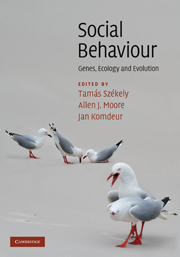Book contents
- Frontmatter
- Contents
- List of contributors
- Introduction: The uphill climb of sociobiology: towards a new synthesis
- Profile: Undiminished passion
- Part I Foundations
- 1 Nature–nurture interactions
- Profile: Social evolution, sexual intrigue and serendipity
- 2 The quantitative genetics of social behaviour
- Profile: Mating systems: integrating sexual conflict and ecology
- 3 Social behaviour and bird song from a neural and endocrine perspective
- Profile: In love with Ropalidia marginata: 34 years, and still going strong
- 4 Evolutionary game theory
- Profile: The huddler's dilemma: a cold shoulder or a warm inner glow
- 5 Recent advances in comparative methods
- Profile: Multi-component signals in ant communication
- 6 Social evolution theory: a review of methods and approaches
- Profile: What's wrong with this picture?
- Part II Themes
- Part III Implications
- Species index
- Subject index
- References
Profile: In love with Ropalidia marginata: 34 years, and still going strong
Published online by Cambridge University Press: 05 June 2012
- Frontmatter
- Contents
- List of contributors
- Introduction: The uphill climb of sociobiology: towards a new synthesis
- Profile: Undiminished passion
- Part I Foundations
- 1 Nature–nurture interactions
- Profile: Social evolution, sexual intrigue and serendipity
- 2 The quantitative genetics of social behaviour
- Profile: Mating systems: integrating sexual conflict and ecology
- 3 Social behaviour and bird song from a neural and endocrine perspective
- Profile: In love with Ropalidia marginata: 34 years, and still going strong
- 4 Evolutionary game theory
- Profile: The huddler's dilemma: a cold shoulder or a warm inner glow
- 5 Recent advances in comparative methods
- Profile: Multi-component signals in ant communication
- 6 Social evolution theory: a review of methods and approaches
- Profile: What's wrong with this picture?
- Part II Themes
- Part III Implications
- Species index
- Subject index
- References
Summary
While interviewing potential candidates for our departmental PhD programme every year, I usually ask the candidates what they would like to work on if they had complete freedom in the matter. Some years ago an unusually determined student gave me a firm answer: he wished to work on lesser cats, asking whatever questions he might be able to and using whatever methods that might work. I tried to argue with him, reminding him that lesser cats were extremely hard to study – they were nocturnal, shy and difficult to locate, let alone observe and obtain quantitative data on. Why not work on an easier animal with which you can ask more sophisticated questions, I pleaded. No, he was adamant – lesser cats it would be, if he had any choice at all. His determination has stayed in my memory ever since. Other students have given me other kinds of answers, though I can recall none as determined as the young man in love with lesser cats. Some students gave primacy to the research field or question and were quite flexible about the study animal and methods to be employed. Others were sold on a method such as computer simulations or field biology, but were quite catholic about the exact questions or of the model organism.
- Type
- Chapter
- Information
- Social BehaviourGenes, Ecology and Evolution, pp. 85 - 87Publisher: Cambridge University PressPrint publication year: 2010
References
- 1
- Cited by



